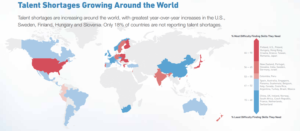How Can An Employer Of Record Help You Stay GDPR-Compliant?
Date
Reading Time

New services like WorkMotion can help secure talent around the world while being compliant
New services like WorkMotion can help secure talent around the world while being compliantRecent events have accelerated big trends in the transformation of the global workforce, revealing a shortage of talent. The best example to illustrate this is how difficult it is to hire an IT team in just one single location, or even in just one country.
While advances in technology are enabling businesses of all kinds to expand internationally, that growth presents unique challenges. Some of those are daunting enough to cause entrepreneurs to delay an international expansion, and miss the chance to continue their business growth. However, as new tools are developed for this new reality, on the hiring front a global Employer of Record (EOR) can take on those challenges, and eliminate boundaries to growth.
While advances in technology are enabling businesses of all kinds to expand internationally, that growth presents unique challenges. Some of those are daunting enough to cause entrepreneurs to delay an international expansion, and miss the chance to continue their business growth. However, as new tools are developed for this new reality, on the hiring front a global Employer of Record (EOR) can take on those challenges, and eliminate boundaries to growth.

Source: Closing the Skills Gap Report
Compliance with laws in multiple countries, regions, states, and even cities can be a substantial hurdle to global expansion. A do-it-yourself approach to establishing and maintaining an international presence is costly and time-consuming. An Employer of Record (EOR) takes on those challenges on behalf of the employer.Simply put, an EOR is a third-party service that takes on a significant amount of the work involved in global employment. An expert EOR can help companies source, hire, manage, and pay their global workforce. They can even manage complex issues such as labor regulation compliance, legal affairs, and risk management. An EOR relationship helps relieve the burden on the employer, while also helping ensure compliance with all relevant laws and regulations. This includes the complex (and widely enforced) General Data Protection Regulation – commonly known as the GDPR.
What is the GDPR and what does it mean for businesses?
On May 25, 2018, the General Data Protection Regulation or GDPR sprang to life, and European data protection laws underwent the biggest change in twenty years. The regulations set out a new framework for data protection, and dramatically impacted the way companies handle customer data.
Now, any information that can be used to identify a person, as well as sensitive data such as religious views and sexual orientation, must be handled in accordance with GDPR. And, any company that controls or processes personal data in the European Union is subject to its regulations.
Because the GDPR also regulates the exporting of personal data to countries outside the EU, it’s a truly global concern. Simply put, any company in any industry operating outside the EU but doing business within the bloc must comply.
A business must comply with GDPR if it meets any of these criteria:
- The company has a presence in an EU country.
- The company does not have an EU presence, but processes personal data of EU residents.
- The company has more than 250 employees.
- The company has fewer than 250 employees, but its data processing affects the rights and freedoms of data subjects or involves certain sensitive types of personal data.
What does the GDPR require companies to do?
The GDPR contains 99 articles setting out the rights of individuals, and the obligations of companies. The most important articles demand that companies:
- Obtain consent from people from whom they collect information.
- Allow individuals access to the information a company holds that’s related to the individual.
- Protect the privacy and personal data of EU citizens obtained through transactions taking place in any EU member state.
Violations of GDPR are costly.
While the standards of the GDPR are high, the fines and penalties for violations are even higher. Fines for a single violation can run as much €20 million, or 4% of global annual revenue – whichever is higher.It’s no surprise that businesses took a serious approach to preparing for the regulations.
According to a survey from PWC conducted before GDPR was launched, 68% of US-based companies planned to pay between £1 million and £10 million to ensure compliance with GDPR. A full 9% expected to pay more than £10 million.
Before the GDPR went into effect, Initial estimates predicted that non-compliance could result in FTSE 100 companies being fined up to £5 billion in the first year alone. And those estimates were borne out. In the UK alone, Marriott was fined £99.2 million and British Airways paid £183.4 million.
How an EOR can help?
Ensuring compliance (and avoiding pricey punishments) requires expertise, resources, and plenty of time. While hiring a full-time regulatory expert is an option for some, many companies quickly decide it makes much more sense to turn to an outside resource. Global EOR services, such as WorkMotion, can shoulder the significant work and responsibilities the GDPR presents.
For businesses of all types and sizes, a global EOR service, offered by WorkMotion is a more efficient, less expensive way to minimise risk and avoid hefty fines that can have a large impact on the bottom line.Thanks to EOR services, there’s no reason the challenges the GDPR presents should act as a barrier to any organisation’s international expansion.
Latest articles

Overcoming talent shortage in Germany with global hiring

10 awesome remote work rituals you should implement in 2024
